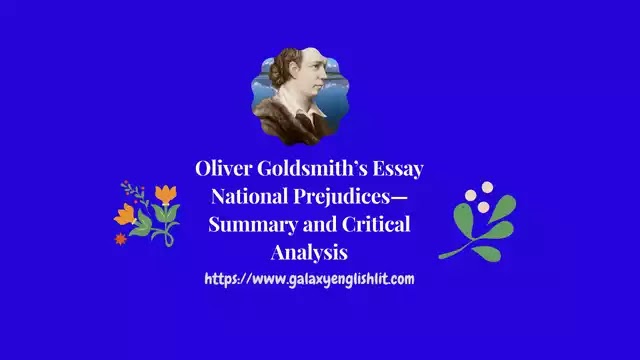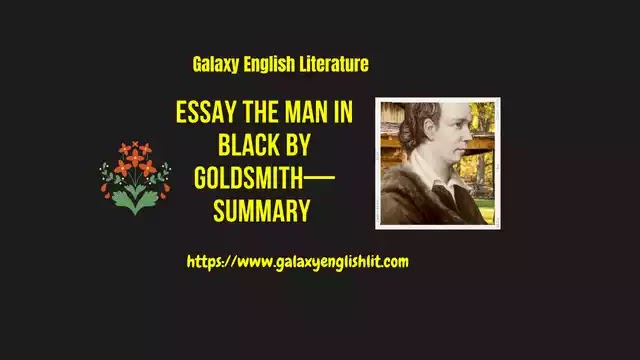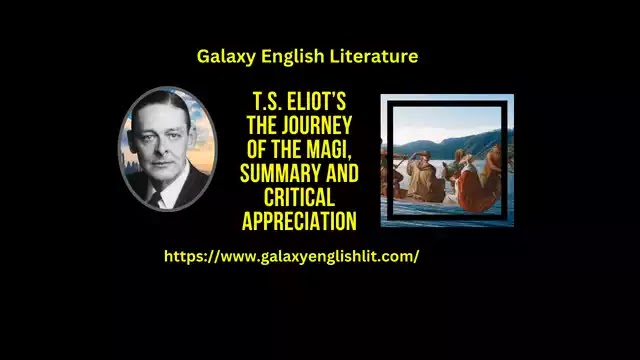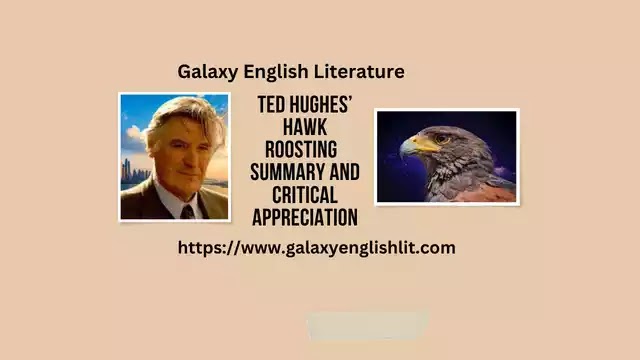Introduction of the Poem:
The poem entitled To the Moon is related to the purpose of human life. It has been written in question - answer form. In it, the poet asks certain pertinent questions and the Moon replies them objectively. The poem forcefully articulates the poet's philosophy of life. The poet is seriously concerned with the question of human life and his existence on the universe. The poet feels that the human life is kicked all the time by the irresistible force of Chance and Fate and it is blindly governed and guided by the purposeless careless Immanent Will. the poet regards ‘life’ as no better than a mere ‘show’.
 |
| Poem To The Moon by Thomas Hardy —Summary and Critical Appreciation |
In his opinion a show cannot be serious and lasting, and so is human life. Man becomes a puppet in the hands of Chance or Destiny or Immanent Will. In Hardy's scheme of the world, there is no place for the Christian God who is benevolent and sympathetic by nature. The poet thinks that consequently, man is tossed upon the stormy currents of life. There is hardly any relief to him. The poet thinks that man is a part of this universe which is cruel and callous towards him. This accounts for all his suffering, for all his trials and tribulations.
Summary of the Poem:
Stanza 1:
What have looked at, Moon
In your time,
Now long past your prime?
O, I have looked at, often looked at
Sweet, sublime,
Sore things, shudderful, night and noon
In my time.
Explanatory Word - Meanings:
1. What ... time= during her eternal wandering in the sky, what things Moon has observed. 2. In your time = while making constant journey through the way of the sky. (The Moon does not stay at one place, but it sets about on its eternal journey and observes everything on the earth.) 3. O, I have ... at= the Moon replies that it has experienced a lot of things during its constant and eternal wandering. 4. Often ... time = it has taken the experience of sweet, pleasureful, beautiful and glorious things, sights and events. It has also come across the bitter, unpleasant and ugly sides of human life. It has observed terrorful and gloomy sights.
Paraphrase:
The poet has serious purpose to explore the meaning of human life. The poet directly addresses the Moon and asks some relevant questions to it. The poet expects that due to its constant and eternal wandering, the Moon has obtained great experience about this physical world. The Moon answers frankly and dispassionately and clarifies its own views in regard to human existence. At first the poet asks the Moon what it has observed and experienced during its constant and eternal wander. At this the Moon replies the poet that it has possessed experience about everything related to this materialistic world and human beings. It has seen the human beings enjoying the sweet and pleasureful life. It has experienced the unbounded joy of human beings. It has found that the man of this physical world remain busy in seeking joy in materialistic things ignoring the pessimistic and ugly sides of life. It has counted the smiles on the face of human beings. It has seen the sublimity of human life. But it has also experienced the bitter things happening in human life. It has observed the terrorful and heart - rending sights in this mortal world. It has found the human life surrounded with sorrow, pain, fear and gloominess. It has seen human beings wailing and weeping at the unexpected happening. It has noticed that human life assumes the glimpse and expression of joy and sorrow.
Stanza 2:
What have you mused on, Moon
In your day,
So aloof, so far away?
O, I have mused on, often mused on
Growth, decay,
Nations alive, dead, men, as woon,
In my day!
Explanatory Word - Meanings:
1. Muse on = to reflect or meditate in silence, as on some subject. 2. What have ... day = the poet asks the Moon what it has meditated over all these things related to human life. 3. In your day= when the Moon shines brightly in the sky and everything is exposed in its silvery light. On Moonlit night the Moon is able to observe everything clearly. 4. Aloof = lonely. 5. So far away= at a great distance. 6. So ... away= the Moon is very far from this noiseful world and it also remains in the state of loneliness, hence it is able to contemplate over the situation of earthly life. 7. Growth = flourishing and being prosper. 8. Decay = ruin, destruction. 9. Nations alive = new nations’ coming into existence. 10. Dead ... day= during its eternal wandering, the Moon has witnessed the destruction of nations in fierceful battles. It has also witnessed the killing of men mercilessly and starvation all around.
Paraphrase:
The poet asks the Moon as to how it has felt, experienced and thought during its eternal wandering. It (the Moon) replies that it has obtained many sweet and bitter experiences. The poet asks over which things it has contemplated seriously by remaining in a state of loneliness and far away from this sorrowful, painful and strugglesome earth. In fact the poet shows his eagerness to know the reactions of the Moon on the pitiable condition of this physical world. The Moon replies the poet that it has often contemplated over the flourishing and declining state of the nations. It has thought about those nations which were rich in wealth, culture, civilization and scientific achievement, but unfortunately they reached in the state of ruin. These nations were completely destroyed. The cause of destruction or disaster of these nations was either war or natural calamity. The Moon has witnessed the rise of new nations, culture and civilization. It has also witnessed bloodshed and human killing in fierceful wars. It has seen a large number of corpses lying in the war field. It has seen the influence of diseases and starvation due to natural disaster.
Stanza 3:
Have you much wondered, Moon,
On your rounds,
Self – wrapt, beyond earth's bounds
Yes, I have wondered, often wondered
At the sounds
Reaching me of the human tune
On my rounds.
Explanatory Word - Meanings:
1. Wondered= felt surprise, astonished. 2. On your rounds= during the Moon's constant and eternal wanderings. 3. Self - wrapt = absorbed in oneself. 4 Beyond the earth's bounds = beyond the worldly or earthly life. 5. Often ... sounds = the Moon has heard the different kinds of sounds of crying, wailing and weeping rising above from the earth and it has felt great surprise to hear these sounds. 6. Reaching me = human sounds reach to the Moon. 7. My rounds = the Moon's wanderings.
Paraphrase:
The poet is greatly curious to know the meaning of human life, so he makes a serious effort to discover the truth related to human life. He wants to know many aspects which have deep concern with the life of human beings. Although the poet seems to attach no great value human life yet he shows his eagerness to know others’ views. Indeed, in poet's opinion human beings live a purposeless life on the earth. He knows that this earth is an abode of sorrows, pains, troubles, tensions, worries, cries and wails, but he wants to satisfy his own judgement. He chooses the Moon for this purpose. He thinks that the Moon can give him right answers of the questions related to human life because it keeps on its eternal wandering in the sky and observes everything and nothing can escape from its eyes. He asks the Moon if it has wondered to see the scenes and activities of earthly life during its constant and eternal wandering. The poet thinks that the Moon is beyond the limits of the earth and it is self-absorbed. During its eternal wandering it remains entirely alone, yet the poet asks the Moon about its feelings of surprise. The Moon responds at the poet's question and replies him that during its constant and eternal wandering, it has felt extremely surprise at the sounds of human beings. It hears different kinds of sounds. These sounds indicate that human beings live an aimless, burdensome and strugglesome life on the earth. The Moon has observed that the human beings are ever surrounded to the worldly worries, sorrows and pains.
Stanza 4:
What do you think of it, Moon,
As you go?
Is life much or no?
O, I think of it, often think of it
As a show
God ought surely to shut up soon,
As I go.
Explanatory Word - Meanings:
1. As you go= when the Moon goes on its eternal journey or wandering. 2. Is life ... no= if there is any meaning and value of human life. 3. As a show= the Moon regards the life only an exhibition. 4. Surely to shut up= the show or exhibition of this world would soon go to an end.
Paraphrase:
The poet has the pessimistic attitude towards life. He finds no meaning in human life. He thinks that man lives a purposeless life on the earth. He has no self-existence and identity. There is no comfort and happiness for him. Man lives a cursed life. He is ever surrounded with sorrows, worries and troubles. He performs his assigned role on this worldly stage and soon the show is over. Human life journey ends very soon. He is merely puppet in the hands of God. The poet asks the Moon what it has observed about human life on the earth during its eternal wandering. He asks if the Moon thinks that human life has some meaning and importance. The poet wants to know the opinion of the Moon about the earthly life of the human beings. At this the Moon replies the poet that it regards the human life no more than a show. The Moon expresses its desire that this show should be ended as soon as possible. In its opinion a show can't be serious and lasting and so is human life. The sooner an end is put to the show, the better it would be. This is quite in keeping with the philosophy of Hardy, who considers the human world as a plaything of the Almighty. The poet feels that the human life is kicked all the time by the irresistible force of Chance and Fate or Environment and it is blindly governed and guided by the purposeless and careless Immanent Will. The Immanent Will has neither love nor hatred, nor goodness, nor kindness, as it is an unconscious force. Hardy tries to explore the real nature of this blind will. He calls this force Crass Casualty. In Hardy's scheme of the world, there is no place for the Christian God, benevolent and sympathetic by nature. He had no faith in a benevolent God as the Christians generally depict Him to be.
Critical Appreciation of the Poem:
Introduction:
The poem entitled “To the Moon” is concerned with the purpose of human life. It has been composed in question - answer form. In it the poet asks certain pertinent questions and the Moon replies them objectively. It forcefully articulates the poet's philosophy of life. The poet is seriously concerned with the question of human life and his existence on the universe. We find a bitter cry of a highly dispirited poet, who has been the worst side of human and who has suffered unspeakably in the human world. This is why he presents a very gloomy and murky picture of this world. The poet's serious attitude towards life is the direct result of his environments and the times in which he was reared up. He sees human beings less as individuals than as representatives of a species. He writes about the human predicament in the universe rather than about his betterment or happiness.
Thought - Content:
The poet has a serious purpose to explore the meaning of human life. He asks the Moon what it has observed and experienced during its constant and eternal wandering. It replies the poet that it has experienced the sweet, pleasureful and bitter things happening in human life. It has found that human life is ever surrounded with sorrow, pain, fear and gloominess. Next the poet asks the Moon over which things it has contemplated seriously by remaining in a state of loneliness and far away from this sorrowful, painful and strugglesome earth. The Moon replies that it has often contemplated over the flourishing and declining state of many nations of the world. It has witnessed blood - shed and human killing in fierceful battles. Next the poet asks the Moon if it has wondered to see the scenes and activities of earthly life during its eternal wandering. It replies that it has felt extremely surprise at the sounds of human beings. The poet asks the Moon if it thinks that human life has some meaning and importance. The Moon replies that it ( the Moon ) regards the human life no more than a show. In its opinion a show cannot be serious and lasting, and so is human life.
The Role of Chance, Fate and Environment:
The poet feels that the human life is kicked all the time by the irresistible force of Chance and Fate or Environment and it is blindly governed and guided by the purposeless careless Immanent Will. The Immanent Will has neither love, nor hatred, nor goodness, nor kindness, as it is an unconscious force. The Immanent Will is the first mover in the sense that it causes both the living and the lifeless to move according to its will. Hardy calls it the Prime mover of the gear, as puppet watches him who pulls the strings. Since the Immanent Will has no consciousness, it is unable to judge the right and the wrong, the good and evil. It works unwittingly like a potter working unconsciously at his wheel; the Will also works keeping things in a state of eternal flux, without being motivated by instincts of love, goodness or kindness. Man becomes puppet in the hands of Chance or Destiny or Immanent Will. In Hardy's scheme of the world, there is no place for the Christian God.
Human Life merely a Show:
Philosophically Hardy seems to adopt a melioristic and not purely pessimistic view of life, though this view is undeniably tragic and sombre. Broadly speaking in the poet's view, man is hardly ever happy but for short interludes, and his life is no better than ‘a show’. This is what we find in the poem, wherein he asks the Moon:
“What do you think of it, Moon,
As you go?
Is life much or no?”
At this the Moon replies:
“O, I think of it, often think of it
As a show
God ought surely to shut up soon,
As I go.”
It is quite clear here that the poet regards human life as a mere ‘show’ unfurled before our eyes for a short while and after that it is no more. He feels that the sooner this life comes to an end, the better it is.
Style and Language:
The poem has been composed in dialogue form, and the diction is simple and lyrical. At places, the poet has employed certain words and phrases twice for the sake of emphasis. The burden of repetitiveness is not so heavy, though; for example, in “I have looked at, often looked at”. “I have mused on, often mused on”, “I have wondered, often wondered”, and in “I think of it, often think of it”. Occasionally we come across musical and alliterative lines like “Sweet, sublime”, “Sore things, shudderful, night and noon” and a line like “God ought surely to shut up soon”. Internal rhymes are found here and there, such as in “Reaching me of the human tune.”





